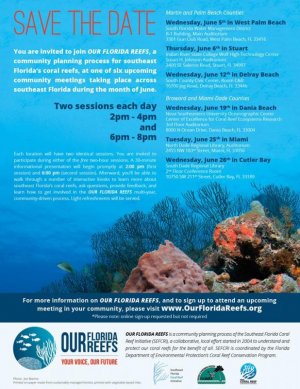privitor
TC.ARK
South Floridians will get the chance this month to share ideas on how to protect 105 miles of coral reef running from northern Biscayne Bay to northern Martin County.
Starting Wednesday in West Palm Beach, six meetings will allow the public to participate in a process called Our Florida Reefs to collect concrete proposals for reef protection.
The meetings, being coordinated by the Florida Department of Environmental Protection, are aimed at plugging a gap in managing South Florida's reefs, vital marine ecosystems that attract boatloads of tourists for fishing, snorkeling and diving.
"The reefs north of Biscayne National Park don't have any sort of coordinated management plan," said Jamie Monty, manager of the Florida Department of Environmental Protection's Coral Reef Conservation Program. "No document says these are the steps we have to take to improve the reefs in this area."
Monty said she didn't want to speculate on what proposals could emerge from the meetings. But she said the state-coordinated Southeast Florida Coral Reef Initiative, which is overseeing the process, had identified four major threats to the reefs:
After the June meetings, a series of working groups will convene to transform the ideas into specific proposals. These will be reviewed in a series of public meetings tentatively set for spring 2015. After that, the proposals will be taken to the relevant government agencies for approval and implementation. The soonest any action could actually take place would be 2016.
Here is the meeting schedule:
Each location will have two identical segments from 2-4 p.m. and from 6-8 p.m.
Starting Wednesday in West Palm Beach, six meetings will allow the public to participate in a process called Our Florida Reefs to collect concrete proposals for reef protection.
The meetings, being coordinated by the Florida Department of Environmental Protection, are aimed at plugging a gap in managing South Florida's reefs, vital marine ecosystems that attract boatloads of tourists for fishing, snorkeling and diving.
"The reefs north of Biscayne National Park don't have any sort of coordinated management plan," said Jamie Monty, manager of the Florida Department of Environmental Protection's Coral Reef Conservation Program. "No document says these are the steps we have to take to improve the reefs in this area."
Monty said she didn't want to speculate on what proposals could emerge from the meetings. But she said the state-coordinated Southeast Florida Coral Reef Initiative, which is overseeing the process, had identified four major threats to the reefs:
- Lack of awareness, with only 50 percent of the South Florida population aware that a major coral reef system existed offshore.
- The impacts of fishing, diving and other activities.
- Land-based sources of pollution, such as stormwater runoff and sewage outfall pipes.
- Shipping activity and coastal development.
After the June meetings, a series of working groups will convene to transform the ideas into specific proposals. These will be reviewed in a series of public meetings tentatively set for spring 2015. After that, the proposals will be taken to the relevant government agencies for approval and implementation. The soonest any action could actually take place would be 2016.
Here is the meeting schedule:
- Wednesday, South Florida Water Management District, 3301 Gun Club Road, West Palm Beach.
- Thursday, Indian River State College Wolf High Technology Center, Stuart.
- June 12, South County Civic Center,16700 Jog Road, Delray Beach.
- June 19, Nova Southeastern University Oceanographic Center, 8000 N. Ocean Drive, Dania Beach.
- June 25, North Dade Regional Library, Auditorium, 2455 NW 183rd St., Miami.
- June 26, South Dade Regional Library,10750 SW 211th St., Cutler Bay.
Each location will have two identical segments from 2-4 p.m. and from 6-8 p.m.

